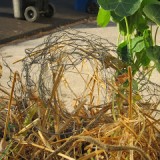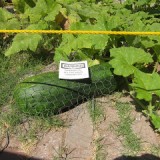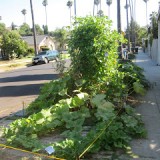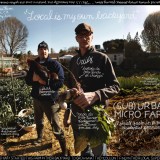An entertaining lecture by permaculturalist Larry Santoyo last night at Project Butterfly was the perfect place to reflect on the whole squash baby debacle. During the talk I thought about just how completely I had abandoned the principles of permaculture in my management of the publicly accessible parkway garden where squash baby once resided. Some thoughts:
1. Rather than try to keep people from taking vegetables in the parkway garden, why not encourage them instead? Put up a sign describing what’s growing and when it’s ready to pick. One problem I’ve had in the past has been folks pulling up unripe vegetables. So some education, in the form of signs, might help. Maybe a chalkboard could detail when things are ready to pick.
2. I could create an honor stand like the one at the organic farm I visited up in Bolinas, Gospel Flat Farm. At Gospel Flat you drop your money in a box. Most of the time the stand is unstaffed. I could do the same and donate any (admittedly small) funds to a charity–perhaps a school garden.
3. In permaculture you value edges and marginal areas. It’s at these intersections where life and culture happen. The parkway is an edge space between the private and the public. Rather than fight this space and try to privatize it, perhaps I should celebrate its public nature. I could add a bench and a water fountain. I could also do a better job of keeping it looking good (my summer garden was hideously ugly and unkempt). A more public parkway garden might also have the paradoxical effect of making it more secure and self-policed, since it will have communal value to folks walking by.
Permaculture works better as social engineering rather than horticultural dogma. Permaculture is not about creating that stereotypical herb spiral. It’s about our relationships both to each other and the natural world. Squash baby provided a much greater lesson by being taken than ending up as gnocchi on our dinner plates.






A better outcome of the whole thing. I’d be very curious to know how your new permaculture parking strip turns out, socially, I mean…
To my knowledge, nobody has ever taken any of the produce I’m growing right next to the sidewalk. I planted my “extras” there, assuming there would be some pilfering. I had considered a sign, something along the lines of “for my good neighbors,” but that had fallen behind more pressing projects. I guess my neighbors are just TOO good. Next time it will be squash next to the sidewalk – nobody else in my house will eat it anyway.
Bravo! Great ideas. I’m so glad you’re seeing the good in this.
Excellent post! Seeing through the permaculture lense often allows us to reposition our point of view so that we become more inclusive rather than exclusive.
When we started a community garden in a urban area on a well traveled street we debated whether or not we should put up a fence to try to keep people out. There were lots of homeless people who wandered the streets in the area. We ultimately accepted them as a part of the community. The 3 of us who were the founders and managers of the garden chose the beds closest to the sidewalk. Our feeling was that if anyone was hungry and wanted to harvest something to eat they could. Also spent time getting to know the people who came by. When we had parties in the garden we always shared food with whomever came by.
The result was that the street people became very protective of the garden and patrolled it at night keeping out the vandals and thieves whose only objective was wanton destruction.
I’m grateful for this reflection…thank you!
Point #1 is very important. I lecture about environmental interpretation. Teaching people about something is the best way to promote that thing’s protection, even more so than physical protection and law enforcement. Signage is key to protecting the more public parts of your garden. In the future, a sign that tells passers-by how old a squash (or whatever) is – a day-counter, for example – might create a normative reaction (guilt) in someone who might otherwise choose to steal.
I love the idea of putting up signs saying when the plants are ready for harvesting. My veggie garden is also in the front yard and I’m always talking to passersby about it when they have questions. It would be great to educate people when I’m not out in the garden too!
“Permaculture works better as social engineering rather than horticultural dogma.”
This is one of the greatest quotes I’ve seen recently! It not only sums up what it is that I find so appealing about Permaculture, but it also highlights what’s wrong with most social engineering projects. Thanks for this insight and the new lines of thinking it’s opening up for me!
Jesse
Nicely sublimated! Your dicactics should also include information and encouragement as regards trimmings, transplanting, harvesting seeds, parkway garden legalities and all that – you could leave out a bunch of seedlings on the third Friday of every month, encourage people to grow their own damn squash baby. And have outdoor screenings of ‘The Secret Life of Plants’
Doug,
We have to arrange that outdoor Secret Life of Plants screening, not to mention your parkway graveyard idea.
I love those ideas. A sign would be good!
What a lovely reflection. We planted a tree yard garden this year and I’m wondering how to deal with it next year when fruits are in season. Working on signage over the winter is on the to-do list.
Lovely insights! Permaculture is great like that, it just sneaks up on you and before you know it you’re fitting the principles to everything. Sonya http://www.permaculturepathways.blogspot.com